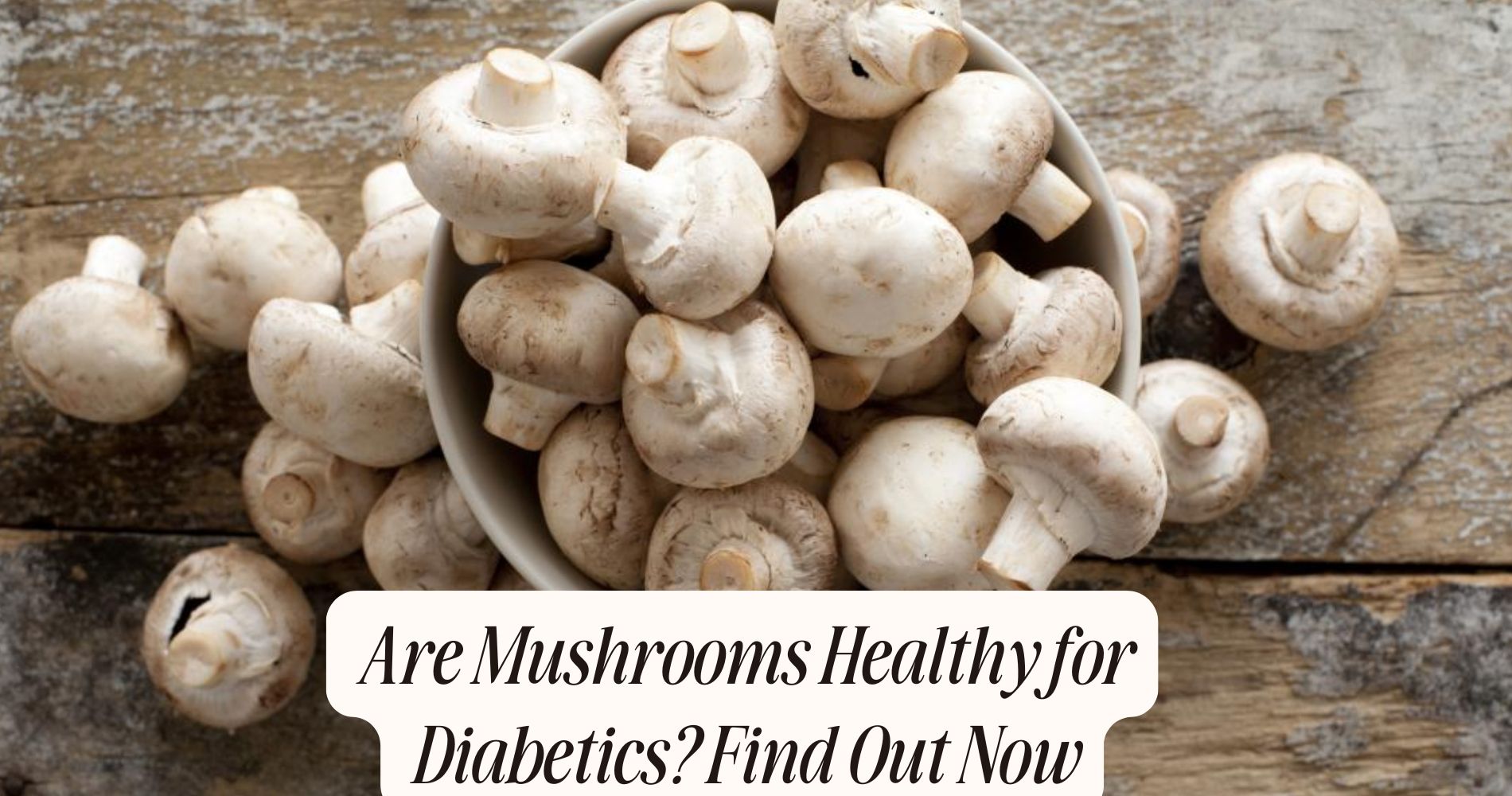
Are Mushrooms Healthy for Diabetics? Find Out Now
Are mushrooms healthy for diabetics? Yes, mushrooms are a healthy choice for diabetics. They're low in calories and carbohydrates, which helps manage blood sugar levels. With a low glycemic index, they cause minimal blood sugar fluctuation. Mushrooms also contain beneficial compounds that enhance insulin sensitivity and are rich in essential vitamins, minerals, and antioxidants. Varieties like shiitake and maitake offer unique health advantages, making them versatile in meals. Cooking methods like sautéing and roasting preserve their nutrients while adding flavor. Incorporating mushrooms into your diet can support effective diabetes management. You'll discover even more reasons to enjoy them as you explore further!
Nutritional Profile of Mushrooms
What makes mushrooms a valuable addition to a diabetic diet? Their impressive nutritional profile sets them apart. Mushrooms are low in calories and carbohydrates, which is essential for managing blood sugar levels. They're packed with vital nutrients, including vitamins B and D, selenium, and potassium. These nutrients support overall health while being gentle on your diet.
You'll find various mushroom varieties, such as button, shiitake, and portobello, each offering unique flavors and textures. This diversity allows you to incorporate them into your meals creatively. Whether you're sautéing them with olive oil or adding them raw to salads, the cooking techniques you choose can enhance their nutritional benefits. Grilling or roasting mushrooms can intensify their natural umami flavor while preserving their healthful properties.

Furthermore, mushrooms contain antioxidants that combat oxidative stress, a concern for many diabetics. By including mushrooms in your meals, you not only enjoy their taste but also boost your nutrient intake.
Glycemic Index and Blood Sugar
Understanding the glycemic index (GI) is essential for managing blood sugar levels, especially for diabetics.
Foods with a low GI can help stabilize your blood sugar, preventing spikes and crashes.
Glycemic Index Explained
The glycemic index (GI) is an essential tool for diabetics looking to manage their blood sugar levels effectively. It ranks foods based on how quickly they raise blood glucose levels after consumption. Foods with a high GI can cause your blood sugar to spike, while those with a low GI lead to a more gradual increase. Understanding this can help you make informed dietary choices.
When considering mushroom varieties, you'll find that most have a low GI, making them a great option for maintaining stable blood sugar levels. The glycemic response to mushrooms is minimal, meaning they won't greatly impact your blood glucose after eating. This quality makes mushrooms a valuable addition to your meals, especially if you're looking to control your carbohydrate intake.
Incorporating low-GI foods like mushrooms into your diet can help you achieve better blood sugar management. Always remember to combine them with other low-GI foods for balanced nutrition.
Blood Sugar Regulation
To maintain ideal blood sugar levels, it's crucial to evaluate how different foods influence your body's glycemic response. Mushrooms, in particular, have a low glycemic index, which means they cause minimal fluctuations in blood sugar levels. This makes them a great choice for those managing diabetes.
Research indicates that specific mushroom compounds, such as beta-glucans and polysaccharides, can enhance insulin sensitivity and aid in diabetes management. These compounds may help regulate your blood sugar by improving your body's ability to utilize insulin effectively.

Incorporating mushrooms into your diet not only provides essential nutrients but also contributes to stable blood sugar levels. They're low in carbohydrates, making them an excellent option for meal planning, as they won't spike your glucose levels.
Additionally, the fiber content in mushrooms can further aid in blood sugar regulation by slowing down digestion and absorption.
This combination of low glycemic impact and beneficial compounds makes mushrooms a versatile and healthful addition to your meals.
Types of Mushrooms for Diabetics
When it comes to managing diabetes, incorporating certain types of mushrooms into your diet can boost your health considerably. Various mushroom varieties offer unique nutritional profiles that may be beneficial for your condition.
For instance, shiitake mushrooms are rich in polysaccharides, which can support immune function and may help in blood sugar regulation.
Another option is maitake mushrooms, known for their potential to improve insulin sensitivity. These medicinal mushrooms contain beta-glucans, which could positively influence glucose levels.
Additionally, reishi mushrooms are often praised for their adaptogenic properties, potentially aiding in stress management, which is vital for diabetics.
You might also consider oyster mushrooms, which provide fiber and important nutrients while being low in calories.
Each of these mushroom varieties can provide you with a range of health benefits that align with your dietary needs.
Remember, while mushrooms can be a great addition to your meals, it's important to maintain a balanced diet and consult with a healthcare professional for personalized advice.
Potential Health Benefits
Mushrooms pack a nutrient-dense punch, offering vitamins and minerals that can support your overall health.
Research suggests they may also help regulate blood sugar levels, which is crucial for managing diabetes.
Nutrient Density Advantages
Many people may not realize the impressive nutrient density that mushrooms offer, particularly for those managing diabetes. Different mushroom varieties, such as shiitake, portobello, and oyster mushrooms, pack a powerful punch of vitamins, minerals, and antioxidants. These nutrients play a vital role in overall health and can support your body's functions more effectively.
One of the standout features of mushrooms is their low calorie count while providing essential nutrients like B vitamins, selenium, and copper. This makes them an excellent choice for a diabetic diet, as they help you maintain nutrient absorption without excessive calorie intake.

Additionally, mushrooms are rich in fiber, which can contribute to better gut health and promote satiety, potentially aiding in weight management. Including these nutrient-dense foods in your meals can help you meet your dietary needs without spiking your blood sugar.
Plus, the versatility of mushroom varieties allows you to experiment with different flavors and textures in your cooking. Incorporating mushrooms into your diet not only enhances your meals but also supports your overall well-being, making them a smart addition to your diabetic-friendly food choices.
Blood Sugar Regulation
Incorporating mushrooms into your diet may offer promising benefits for blood sugar regulation, especially for those managing diabetes. Various mushroom varieties, such as shiitake and reishi, are rich in compounds that can positively influence blood sugar levels. Research indicates that these mushrooms contain polysaccharides, which may enhance insulin sensitivity and promote better glucose control.
Moreover, mushrooms are low in carbohydrates and high in fiber, making them an excellent choice for a diabetes-friendly diet. Their fiber content can help slow the absorption of sugar, potentially preventing spikes in blood glucose levels after meals.
Additionally, the antioxidants found in mushrooms may reduce inflammation, a common issue for people with diabetes that can complicate blood sugar management.
While mushrooms alone won't replace conventional diabetes management strategies, they can be a valuable addition to your overall dietary plan. Combining various mushroom varieties in your meals not only adds unique flavors but may also contribute to more stable blood sugar levels.
Always consult with your healthcare provider before making significant dietary changes, especially if you're managing diabetes, to verify they align with your individual health needs.
Cooking Methods for Diabetics
When it comes to cooking methods for diabetics, choosing techniques that preserve the nutritional quality of foods while managing blood sugar levels is essential. For mushrooms, two effective methods you can use are sautéing and roasting.
Sautéing techniques involve cooking mushrooms quickly in a small amount of healthy oil, such as olive oil, which can enhance their flavor without adding excessive calories. This method also helps to retain nutrients, making it a great option for incorporating mushrooms into your meals.
Aim for moderate heat to avoid burning, which can create harmful compounds.
On the other hand, roasting options provide a flavorful and low-fat way to prepare mushrooms. Simply toss them with some herbs and spices, then roast in the oven until they're tender.
This method caramelizes the natural sugars in the mushrooms, adding depth to their taste without spiking your blood sugar.
Both cooking methods allow you to enjoy mushrooms while keeping your meals diabetic-friendly.
Remember to pair them with other nutrient-dense ingredients, ensuring you create well-rounded dishes that support your overall health.
Portion Control and Serving Sizes
Portion control plays an essential role in managing blood sugar levels for diabetics. Understanding appropriate portion sizes can help you maintain stable glucose levels while still enjoying a variety of foods, including mushrooms.
Mushrooms are low in carbohydrates and calories, making them an excellent choice for your meals. When it comes to serving suggestions, aim for about one cup of cooked mushrooms per meal. This portion provides a good balance of nutrients without overloading on carbohydrates.

You can easily incorporate mushrooms into soups, salads, or stir-fries, ensuring you stay within your desired portion sizes. Remember, moderation is key. While mushrooms are healthy, it's important to reflect on how they fit into your overall meal plan.
Pairing mushrooms with other non-starchy vegetables and lean proteins can create a well-rounded dish that supports your dietary needs. Using measuring cups or a kitchen scale can help you accurately gauge portion sizes until you become more familiar with serving suggestions.
Incorporating Mushrooms Into Meals
Mushrooms can effortlessly enhance the nutritional profile of your meals while keeping carbohydrates in check. With a variety of mushroom types available, such as shiitake, portobello, and cremini, you can easily find options that suit your taste and dietary needs. Incorporating these mushroom varieties into your meals not only adds flavor but also provides essential nutrients, including fiber, vitamins, and antioxidants.
When planning meal pairings, consider adding mushrooms to stir-fries, soups, or salads. For instance, sautéing sliced portobello mushrooms with garlic and spinach creates a delicious side dish rich in nutrients. You can also blend finely chopped mushrooms into ground meat for burgers or meatballs, boosting the meal's fiber content while reducing overall calories.
Don't forget about breakfast! Adding diced mushrooms to an omelet or frittata can elevate your morning routine.
With their versatility, mushrooms can be a fantastic ingredient in a diabetic-friendly diet, helping you maintain balanced blood sugar levels and enjoy a wide range of flavors.
Expert Opinions and Research Findings
Research on the benefits of mushrooms for diabetics has gained traction among nutritionists and health professionals. Various mushroom varieties, such as shiitake, maitake, and reishi, have been studied for their potential roles in diabetes management.
These fungi are low in calories and carbohydrates, making them a great option for maintaining stable blood sugar levels. Experts emphasize the importance of incorporating mushrooms into a balanced diet.
They offer essential nutrients, including fiber, vitamins, and minerals, which can support overall health. Some studies suggest that certain compounds found in mushrooms may enhance insulin sensitivity and help regulate blood glucose levels.
However, while the evidence is promising, it's vital to take into account mushrooms as part of a broader diabetes management strategy. You shouldn't rely solely on them for blood sugar control.
Instead, think of them as a flavorful addition to your meals that can complement other healthy dietary choices.
Support Diabetic Health with 10-IN-1 MUSHROOM GUMMIES
If you’re asking are mushrooms healthy for diabetics, Well Gummies’ 10-IN-1 MUSHROOM GUMMIES offer a convenient and delicious way to enjoy the benefits of mushrooms for blood sugar management. Each vegan gummy contains 10 functional mushrooms, including varieties known to support glucose metabolism, calm energy, and immune health. With a delightful wild berry flavor, these gummies are an easy addition to your daily routine, delivering balanced energy without jitters or crashes. Enjoy a natural, tasty way to boost your wellness and support a diabetic-friendly lifestyle.
Frequently Asked Questions
Can Mushrooms Help Reduce Diabetes-Related Complications?
Mushrooms contain antioxidants and exhibit anti-inflammatory properties, which can help you manage diabetes-related complications. By incorporating them into your diet, you may support your overall health and reduce inflammation linked to diabetes.
Are There Any Side Effects of Mushrooms for Diabetics?
You should be aware that while mushrooms offer nutritional benefits, some individuals may experience mushroom allergies. It's crucial to monitor your body's reactions, as allergic responses can lead to discomfort or other complications. Stay informed!
How Do Mushrooms Interact With Diabetes Medications?
Mushrooms can enhance diabetes management by supporting insulin sensitivity and lowering blood sugar levels. However, always check with your healthcare provider, as they might interact with diabetes medications, affecting their effectiveness in your treatment plan.
Can Mushrooms Affect Insulin Sensitivity in Diabetics?
Mushroom types like shiitake and maitake can enhance insulin response, potentially improving insulin sensitivity. Incorporating these varieties into your diet may help manage blood sugar levels, but you should always consult your healthcare provider first.
What Are the Best Mushroom Varieties for Overall Health?
When considering the best mushroom varieties for overall health, shiitake and portobello offer significant nutritional benefits and diverse culinary uses. Incorporating these mushrooms into your meals enhances flavor while providing essential vitamins and minerals for your diet.
Conclusion
Incorporating mushrooms into your diet can be a healthy choice for managing diabetes. Their low glycemic index, high fiber content, and rich nutrient profile support blood sugar control and overall health. With various types available, you can enjoy diverse flavors and health benefits. Just remember to practice portion control and choose healthy cooking methods. By adding mushrooms to your meals, you can enhance your diet while keeping your blood sugar in check. Always consult with a healthcare professional for personalized advice.




